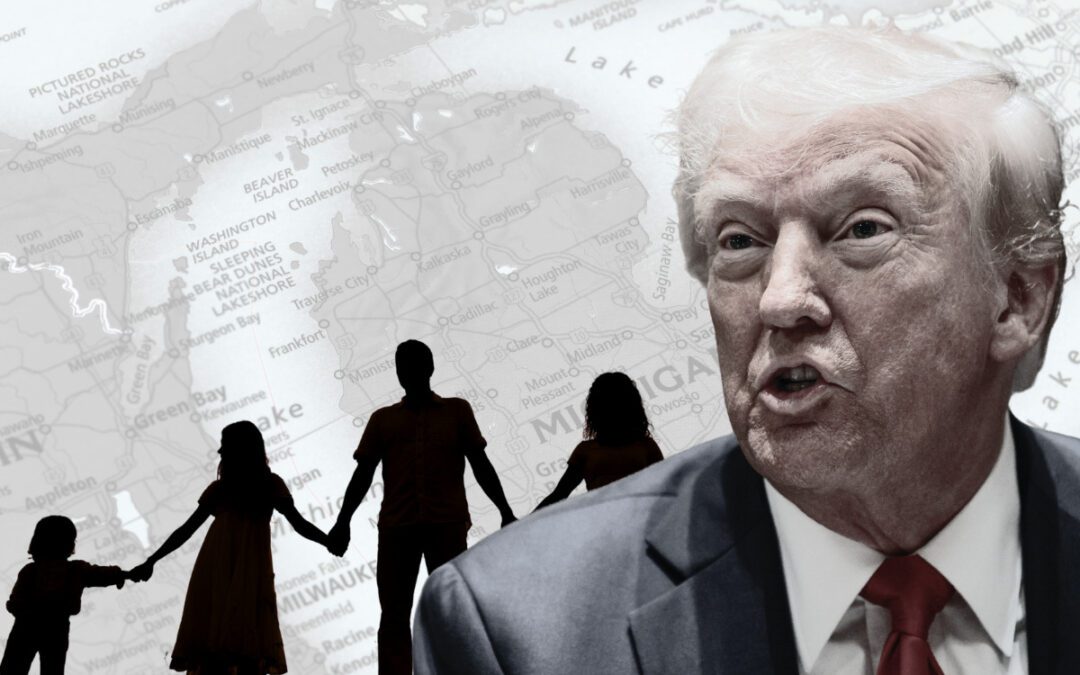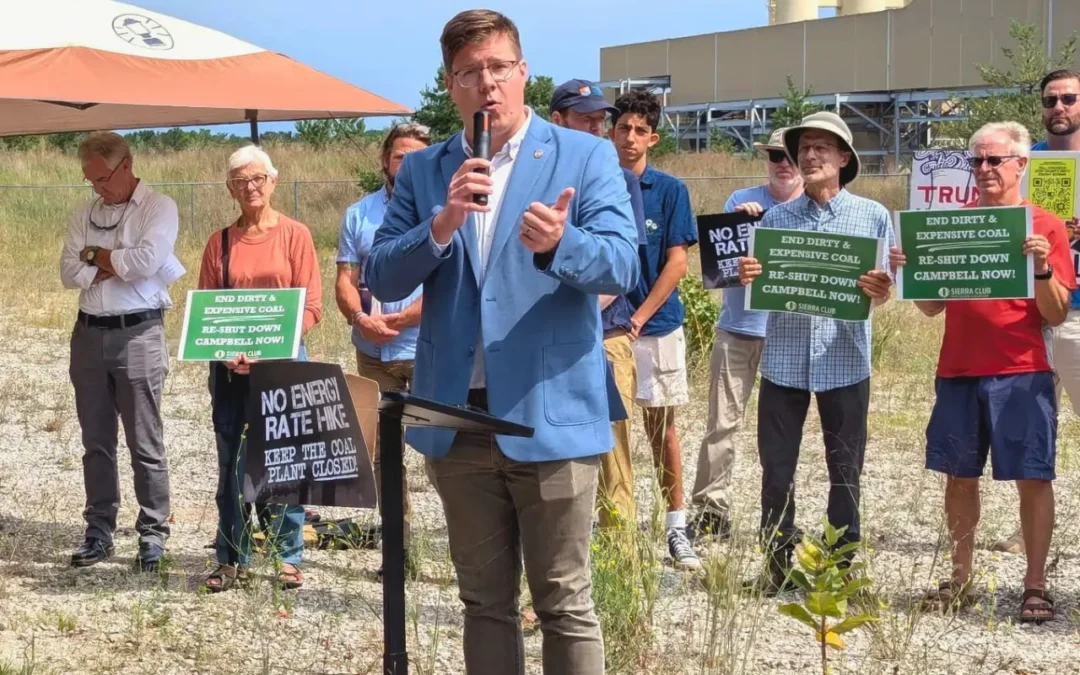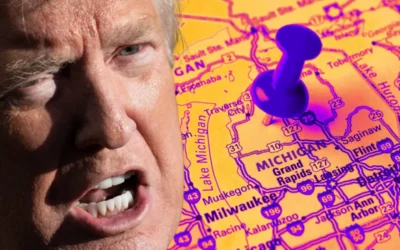
Photo Illustration/Andrew Caballero-Reynolds/AFP via Getty Images
From massive repair bills to lost tourism revenue, Michigan would be stuck paying the price if Republicans move forward with their plans to dump national parks onto the states.
LANSING— A new report from Climate Power warns that President Donald Trump’s vision for shrinking the national park system would stick Michigan with the bill and leave the state’s local communities, particularly those near park sites in Northern Michigan, paying the price.
While Congress ultimately rejected a Trump-backed proposal to begin transferring national parks to individual states, advocates say the idea isn’t going away. And if the Trump administration continues to push plans to downsize the National Park Service or abandon some parks altogether, Michigan would be among the hardest hit states, according to the new report.
All told, the report estimates that Trump’s plans would shift more than $150 million in park maintenance and additional staffing costs onto Michigan taxpayers, while simultaneously raising visitor fees, slashing tourism revenue, and putting active military and veterans’ benefits at risk.
“It would mean fewer jobs, higher costs for states, and broken promises to veterans and seniors who’ve earned the right to enjoy our parks,” Lori Lodes, executive director of Climate Power, said in a statement announcing the report this week. “We have a responsibility to protect these lands for our children and grandchildren—not abandon them to budget cuts and neglect.”
What’s the deal?
Trump’s initial 2026 budget proposal included a provision that called for the federal government to begin transferring certain national park sites to the states—particularly those with lower visitation or regional significance. The stated goal: cut costs and streamline operations.
That idea didn’t make it into the final bill, thanks to bipartisan pushback in Congress.
But park advocates say the Trump administration is now trying different tactics to accomplish the same goal by defunding the National Park Service, pushing budget cuts, and laying the groundwork for future downsizing, or offloading altogether to the states in which they’re located.
“We had a huge win,” US Sen. Martin Heinrich (D-New Mexico) said on a press call announcing the report this week. “We know that this fight is still far, far from over. The Trump Administration has made it clear that it’s determined to sell off many of our public lands—lands that are literally your birthright as an American—all to fund tax cuts for their billionaire friends and donors.”
What could this mean for Michigan?
If Trump and Republicans in Congress decide to move forward with efforts to shrink the park system, the costs for states could be staggering—and Michigan wouldn’t be spared.
According to the Climate Power report:
- About $158 million in maintenance costs would be pushed onto Michigan if the state were forced to take over operations at its six federal park sites, including Isle Royale National Park and the Pictured Rocks and Sleeping Bear Dunes national lakeshores.
- Entrance fees could spike. Sleeping Bear Dunes currently charges $25 per vehicle. To offset the loss of federal funding, that fee would need to increase to an estimated $65.
- Michigan would need to hire at least 110 employees to match current staffing levels, all without the training programs or volunteer networks that currently support federal parks.
- Nearly half a billion dollars in economic activity could be at risk as reduced services and higher fees lead to fewer park visitors—and fewer dollars spent at local businesses.
- Veterans, seniors, and active-duty military may lose federal park access benefits under state control, which could include new fees, residency restrictions, and blackout dates.
Can Michigan even afford this?
While the Trump administration has framed its plan for national parks as a win for federalism, most states simply aren’t interested and can’t afford to assume oversight of their national parks.
Many states are already struggling to fund their own park systems. Taking on new responsibilities over federal land—especially for national park sites that span across multiple states like the North Country Trail—would stretch their budgets and staff even thinner.
In Michigan, state parks rely heavily on user fees. Absorbing national park sites into the system would either drive up those admission costs for visitors or force cuts to existing state services.
“By transferring ‘sort of small-p parks’ to the states, the Trump Administration and its supporters aren’t giving states more power or saving taxpayer money,” Heinrich said this week. “They’ll be cutting off your access to public lands and devastating state economies in the process, overwhelming state budgets and dismantling the systems that keep public lands running.
What happens next?
While Congress blocked the latest Trump-backed proposal, advocates say the fight is far from over. The Trump administration has already signed into law the largest budget cut in National Park Service history—about $267 million—and is still floating ideas for offloading national park sites, cutting staff, and shrinking public land protections. Watchdog groups say they expect more plans to develop over the coming months and are urging Congress to remain vigilant.
“Two weeks ago, we came together, across the political spectrum, to stop the sale of our public lands,” Heinrich said this week. “And we’re here to say: Not one acre and not on our watch.”
READ MORE: Michigan literacy center begins layoffs amid Trump’s funding freeze
Don’t miss Michigan’s biggest stories—follow The ‘Gander on X.
Support Our Cause
Thank you for taking the time to read our work. Before you go, we hope you'll consider supporting our values-driven journalism, which has always strived to make clear what's really at stake for Michiganders and our future.
Since day one, our goal here at The 'Gander has always been to empower people across the state with fact-based news and information. We believe that when people are armed with knowledge about what's happening in their local, state, and federal governments—including who is working on their behalf and who is actively trying to block efforts aimed at improving the daily lives of Michigan families—they will be inspired to become civically engaged.


Opinion: The America my parents believed in is disappearing
Michigan State Rep. Mai Xiong reflects on the fear Trump's immigration policies are causing for Michigan families. Last November, I wrote in the...

Activists, officials call for closure of Ottawa County coal plant as utility looks to recover costs
BY SARAH LEACH, MICHIGAN ADVANCE OTTAWA COUNTY—“We are standing here today to stand up to the Trump Administration to tell them, ‘Get this coal...

MAGA Michigan sheriff faces new criticism for politicking with official resources
BY BEN SOLIS, MICHIGAN ADVANCE MICHIGAN—Livingston County Sheriff Mike Murphy, who’s also running for the Michigan Senate, held a political...

Michigan disability advocates slam cuts to SNAP and Medicaid as attacks on autonomy
BY KYLE DAVIDSON, MICHIGAN ADVANCE LANSING—Standing before the Michigan State Capitol on Tuesday, a group of disability self-advocates took Congress...

7 Michigan Republicans vote to help Trump gut health care for 200,000 Michiganders
Michiganders are bracing for consequences after President Donald Trump signed Republican-led legislation to cut federal funding for Medicaid. ...




